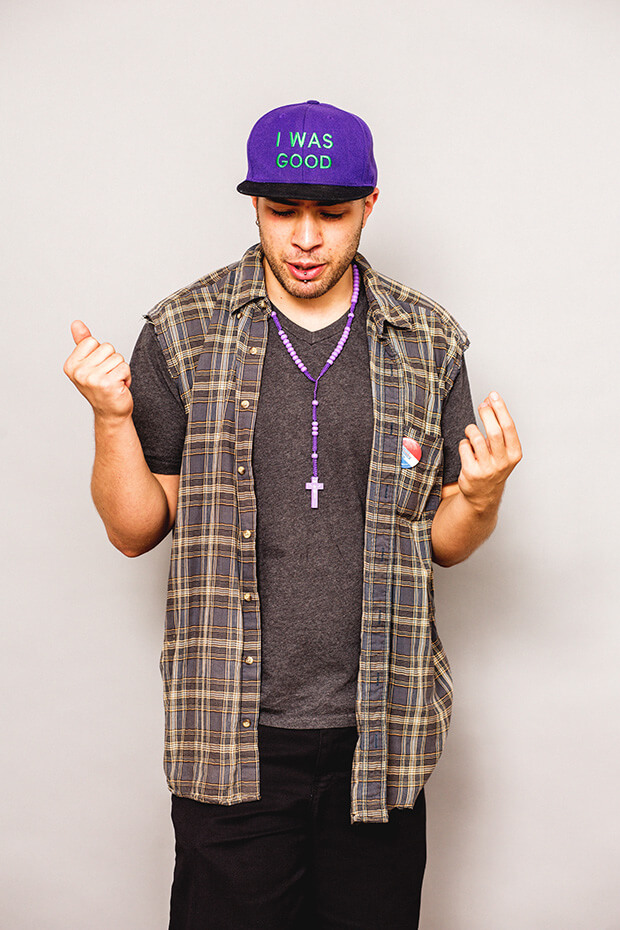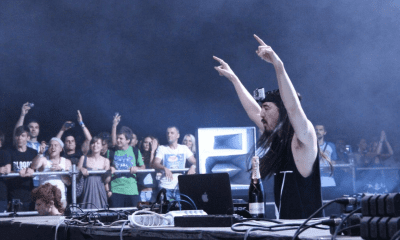“I Fucking Hate Magic”: Jordan Michael Iannucci Sounds Off on Silent Barn, Beer Koozies, and Insane Clown Posse


photos by Nicolas Maloof
“What kids need…” starts Jordan Michael Iannucci, before a wave of deep dread immediately derails him. “‘Kids?’ Oh my God, fuck me. I’m an Italian guy wearing rosary beads and a track suit, saying what kids need.” That we were sitting at an outdoor bar in the last, lingering Italian section of Williamsburg, about a block from a pork store in every direction, did not help the sudden onset identity crisis. The rosary and track suit were not metaphorical. “Fuck my life,” he says. “Jesus Christ take me now.”
Iannucci, just 26 himself, is a young veteran of Brooklyn’s independent music scene. After getting kicked out of Bennington College in the mid-2000s (the school Bret Easton Ellis based his debauched collegiate novels on in the 80s, so no small feat) he spent a few years as “a very aggressive yuppie” before devoting himself fully to the city’s various interconnected art scenes. He was a co-founder of, and key booker for the Silent Barn as both versions of that concert space and community center became a trusted refuge for new, unknown bands in the city. He’s the former editorial director and concert listings compiler of beloved, but defunct, all-ages events and art publication Showpaper. Currently, he’s an alternative comic book publisher, cassette label head, beer koozie designer, non-stop show promoter, enthusiastic champion of new talent, and an all-around restlessly creative guy.
Recently he’s been in a state of mild crisis, dealing with the fallout from a September 25th electrical fire at Silent Barn that forced the venue’s live-in residents to vacate, and the shows scheduled there to scatter among the Brooklyn’s other independent rooms. Not unusually, the water used to put out the fire was as destructive as the fire itself. The ceiling was ripped out and replaced. Molded drywall had to go. It’s a second notable bit of bad luck for the venue which, in its previous Ridgewood incarnation, was the victim of theft and vandalism in 2011. Bouncing back required a massive Kickstarter campaign. Substantial support from the community has again come pouring in post-fire, both in material goods from local businesses and direct contributions from individuals. Young bands like Girlpool and Big Ups have released benefit singles, and fundraising shows have arranged across the borough. Last Friday night, a benefit concert featuring indie rockers Alex G, Frankie Cosmos, Palm, and Emily Yacina sold-out a big, one-use-only industrial space on the far edge of industrial Williamsburg. “I’ve read the name of every single person who’s donated money,” says Iannucci, “and it feels like the end of It’s a Wonderful Life.”
He’s surprisingly upbeat about the Barn’s ability to quickly recover. “I think there’s a good chance that people can move back in by November,” he says. “I think we could be back for shows next week.” (This estimate was re-affirmed last week, and previously scheduled CMJ shows this week in the space will likely stay put.) Iannucci is the third-longest tenured member of the Silent Barn collective, serving as part of the lease-holding LLC, and acting as a sort of accountant for the whole enterprise. This confusing tide of debits and credits, insurance payouts, and contractor retainers, falls largely to him to sort out. Silent Barn runs non-heirarichally, so no one person is calling the shots. But Iannucci personally envisions a deeper push for sustained fundraising, outside of necessary post-calamity financial triage, as the key to the space’s survival going forward.
“Silent Barn, essentially, has three sources of income,” he explains. “There’s rentals, people renting studio space, people renting apartments. There are shows, people spending money at the bar and paying in for tickets. The third thing is fundraising. I honestly think 95 percent of the money we have raised from fundraising has been from tragedy. It’s been this or the Kickstarter. But really that’s the only way we can grow. Because in order to expand programming, we’d have to become a type of venue that isn’t needed. New York has a surplus of business-minded venues. I want to start taking shows that don’t do as well, because the biggest need in the New York City show economy is shows that are hospitable to audiences of less than 40. [The New York City music scene is] slowly reaching a pay to play model because places like Big Snow don’t exist anymore.”


He also plans to make the space’s nightly accounting open and searchable for anyone interested. “I really want to hit a model of transparency,” he says. “I fucking hate magic. Everything works a certain way for a reason, and I want to know what it is. When it comes to shows, I felt incredibly empowered knowing how it works. I want to do what I do in a way that allows other people…I’m a weird goofball, and I want people to feel that I’m not anyone special and they can book shows, because that’s how I felt. And it dramatically impacted my life for the better.”
Outside of Silent Barn, JMC Aggregate takes up the rest of Iannucci’s working life. The name of his long-time show-booking operation now carries over to include publishing projects (art books and comics series) and music releases (6 cassettes released this year, more, an LP is already planned for 2016). These projects are temporarily financed by a retirement fund inherited from his father, who worked the same job from age 19 to 64 before passing away last year. “I have enough money to do JMC stuff for a year, and get the ball rolling on all the publishing and writing stuff I’m doing,” he says. “I have enough for two years of publishing stuff.” His philosophy for the cassette label, which has so far featured local bands like Palberta and Big Neck Police, is as simple as “the bands I’m most excited about that don’t have a platform better than me.” His goal, with all these endeavors, is to cultivate a small but loyal audience of likeminded people whose interests can’t be pinned down to reductive categories like “music fan,” or “comics fan.”
“My role models are the Insane Clown Posse,” he says. “Definitely not in terms of aesthetics or personal morals, but in terms of their business model and how it relates to their audience and what they produce. If you like rap music, and heavy metal, and B comedy, and professional wrestling, and wearing clown make-up, and carnival rides, and soft drinks that are regional to Michigan, than you like the Insane Clown Posse. There are so many prerequisites to getting on board that it is amazing they have any fans, but they have so many! Their world is vertically integrated. They produce, distribute and promote directly to their incredibly specific audience. With hands in so many pots they are arguably only in the industry of connecting like-minded weirdos… I want to be clear that this is under no circumstances a joke answer.”
Connecting like-minded weirdos has become a sort of life’s mission for Jordan. Looking back at hundreds of DIY shows booked, with thousands of bands featured, the things he remembers most fondly is the personal impact of the social interactions these events enable. “One of the bands I used to book a lot told me that the second show I booked for them, he kissed his girlfriend for the first time at the show. It’s one of the proudest things I have,” he says. “Stuff like that means so much to me. I want to create a positive environment for people to grow up in.”
You might also like 




















